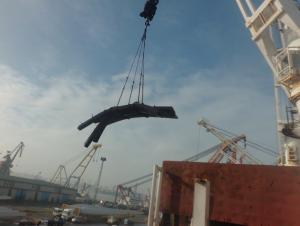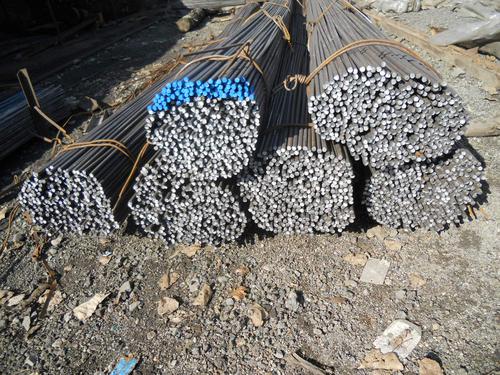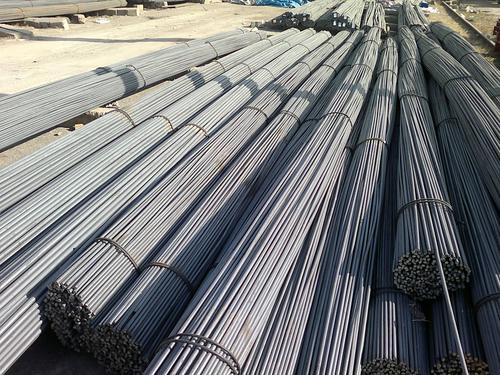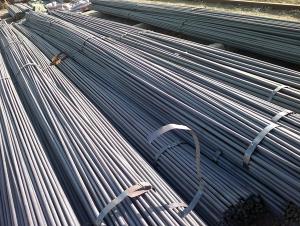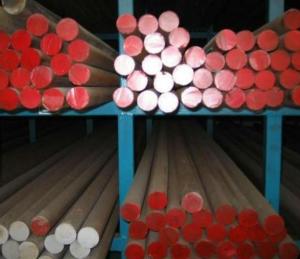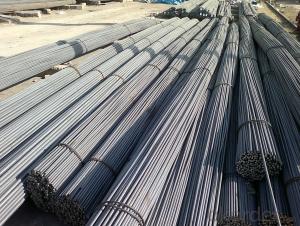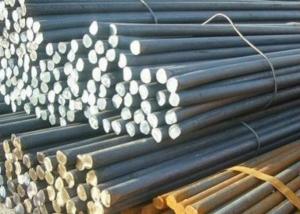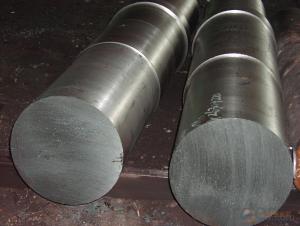mild steel round bar
- Loading Port:
- China Main Port
- Payment Terms:
- TT OR LC
- Min Order Qty:
- -
- Supply Capability:
- -
OKorder Service Pledge
OKorder Financial Service
You Might Also Like
Specifications of High Quality Round Bar
1. Grade: GB, JIS, ASTM, EN
2. Grade: Q235, SS400, A36, S235JR
3. Diameter and mass: As below
Diameter | Mass | Diameter | Mass | Diameter | Mass |
(mm) | (kg/m) | (mm) | (kg/m) | (mm) | (kg/m) |
6 | 0.22 | 22 | 2.98 | 53 | 17.30 |
7 | 0.30 | 24 | 3.55 | 56 | 19.30 |
8 | 0.40 | 25 | 3.85 | 60 | 22.20 |
9 | 0.50 | 26 | 4.17 | 63 | 24.50 |
10 | 0.62 | 28 | 4.83 | 65 | 26.00 |
11 | 0.75 | 30 | 5.55 | 70 | 30.20 |
12 | 0.89 | 32 | 6.31 | 75 | 34.70 |
13 | 1.04 | 34 | 7.13 | 80 | 39.50 |
14 | 1.21 | 36 | 7.99 | 85 | 44.50 |
15 | 1.39 | 38 | 8.90 | 90 | 49.90 |
16 | 1.58 | 40 | 9.86 | 95 | 55.60 |
17 | 1.78 | 42 | 10.90 | 100 | 61.70 |
18 | 2.00 | 45 | 12.50 | 120 | 88.85 |
19 | 2.23 | 48 | 14.20 | 140 | 120.93 |
20 | 2.47 | 50 | 15.40 | 150 | 138.82 |
4. Material: Mild Steel
5. Heat treatment of high quality steel:
Fire: Isothermal annealing temperature is 800 ~ 880 °C, with 10 ~ 20 °C, the furnace cooling to about 600 °C, hardness above HB269.
Preheat temperature: 730-730 °C
Quenching temperature: 1190-1210 °C
Tempering temperature: 540-595 °C
Cold drawn, hardness 285 HBS
Cold drawn after annealing condition, hardness 277 HBS
Quenching methods: oil quenching, air cooling or salt bath quenching
Usage and Applications of High Quality Round Bar
1) Suitable for making various strong cutting tool abrasion resistance, impact resistance.
2) Used to produce all kinds of high hard and super hard saw blade, drill, tap, broach, gear hob and various kinds of milling cutter.
3) Used for advanced punching die, screw die, and the toughness and complicated shape of the punch, etc.
4) Is used for cold forging die and drawing mode, etc.
5) Recommended watchcase factory, screw factory and other cold stamping products industry use.
Packaging & Delivery of High Quality Round Bar
Packaging Detail: All goods are packed in bundle with steel strips and shipped by break bulk vessel or container (depend on target market and different ports)
Delivery Detail: 45 days
Trade terms: FOB, CFR, CIF
MOQ: 25 tons per specification; we can negotiate the quantity if the specification is normal or we have stock of one specification.
Weight: The price invoicing on theoretical weight basis or actual weight basis depends on customer’s request.
Shipment: The shipment of bulk break or container is depends on customer’s request and the situation of the port of destination.
Documents given: Full set of original clean on board bill of lading; Original signed commercial invoice; Original packing list; Policy of insurance; Certificate of origin and what the target market needs.
Production Flow of High Quality Round Bar
The common processes are preheated forging quenching, dual refinement solution process, cooling quenching and isothermal quenching. We use heat treatment for dual refinement solution process. The main measures process is high temperature solution and refinement cycle. High temperature solution can improve the carbide morphology and particle size. The aim is to make the loop refinement ultrafine austenite grains.
- Q: What are the different grades of alloy steel round bars for automotive applications?
- Alloy steel round bars are commonly used in automotive applications due to their excellent strength, durability, and resistance to wear and corrosion. These bars are typically graded based on their chemical composition, mechanical properties, and suitability for specific automotive uses. Here are some of the different grades of alloy steel round bars commonly used in automotive applications: 1. 4140/42CrMo4: This is a widely used grade of alloy steel round bars known for its high tensile strength, good toughness, and excellent fatigue strength. It is commonly used in applications such as gears, crankshafts, axles, and suspension components. 2. 8620: This grade of alloy steel round bars offers excellent hardenability and can be heat treated to achieve high strength and toughness. It is commonly used in applications such as shafts, gears, and camshafts. 3. 4340: This grade of alloy steel round bars is known for its high strength and toughness. It offers good wear resistance and can be heat treated to achieve even higher hardness and strength. It is commonly used in applications such as connecting rods, crankshafts, and high-stress components. 4. 52100: This is a high carbon, chromium alloy steel known for its excellent hardness and wear resistance. It is commonly used in applications such as bearings and races, where high strength and durability are required. 5. 316L: This grade of alloy steel round bars is known for its excellent corrosion resistance, particularly in harsh environments. It is commonly used in automotive applications such as exhaust systems, where resistance to corrosion is critical. 6. 4340M: This is a modified version of the 4340 grade, specifically designed for high-performance automotive applications. It offers improved fatigue strength and toughness, making it suitable for demanding applications such as high-performance engine components. These are just a few examples of the different grades of alloy steel round bars used in automotive applications. The specific grade chosen depends on the requirements of the application, including the desired strength, toughness, wear resistance, and corrosion resistance.
- Q: What is the difference between a bright and a cold finished steel round bar?
- Two distinct types of steel bars are the bright steel round bar and the cold finished steel round bar. These bars differ in their manufacturing processes and resulting characteristics. The bright steel round bar, also known as a turned or polished bar, undergoes a process called turning or polishing. During this process, a lathe machine rotates the rough steel bar while a cutting tool removes its outer layer. This results in a smooth and shiny surface, enhancing the bar's appearance, dimensional accuracy, and surface finish. Bright steel round bars are commonly used in applications where aesthetics and a high-quality surface finish are important, such as architectural components, decorative items, and certain automotive parts. On the other hand, the cold finished steel round bar undergoes a different manufacturing process called cold drawing or cold rolling. This process involves passing the hot-rolled steel bar through a series of dies at room temperature. As a result, the bar's diameter is reduced while its length is increased. This cold working process improves the mechanical properties of the steel bar, including increased tensile strength, improved yield strength, and enhanced dimensional accuracy. Cold finished steel round bars are often used in applications that require high strength and precision, such as shafts, gears, bolts, and tools. In conclusion, the main distinction between the bright steel round bar and the cold finished steel round bar lies in their manufacturing processes and resulting characteristics. The bright steel round bar is turned or polished to achieve a smooth and shiny surface, while the cold finished steel round bar undergoes cold drawing or rolling to enhance its mechanical properties and dimensional accuracy. The choice between these two types of steel bars depends on the specific requirements of the application, such as the need for aesthetics, surface finish, strength, or precision.
- Q: Can steel round bars be used in the production of power tools?
- Yes, steel round bars can be used in the production of power tools. Steel round bars are often used as raw materials for manufacturing various components and parts of power tools due to their high strength, durability, and resistance to impact and wear. These bars can be machined, shaped, and heat-treated to create the necessary components, such as shafts, handles, and gears, that are crucial for the proper functioning of power tools.
- Q: What are the different types of steel round bars used in the automotive steering systems?
- There are several types of steel round bars used in automotive steering systems, including carbon steel, alloy steel, and stainless steel. Carbon steel round bars are commonly used due to their affordability and high strength properties. Alloy steel round bars are used when higher strength and durability are required, as they have additional alloying elements such as chromium, nickel, and molybdenum. Stainless steel round bars are preferred for their corrosion resistance properties, making them suitable for steering components exposed to harsh environments or moisture.
- Q: Can steel round bars be used for structural purposes?
- Yes, steel round bars can be used for structural purposes. Round bars are commonly used in construction and engineering projects for their strength and durability. They can be used as load-bearing members in buildings, bridges, and other structures, providing support and stability. Steel round bars are available in various grades and sizes, allowing for versatility in design and application. They can be easily welded, formed, and machined to meet specific project requirements, making them a popular choice for structural applications.
- Q: What are the different types of steel round bars used in the manufacturing of shafts?
- When manufacturing shafts, various types of steel round bars are commonly used. The selection of the steel round bar depends on the specific application and requirements of the shaft. Here are some of the frequently utilized types: 1. Carbon Steel Round Bars: These round bars are the most commonly used in shaft manufacturing. Carbon steel provides good strength and toughness, making it suitable for a range of shaft applications. 2. Alloy Steel Round Bars: By adding elements like chromium, nickel, or molybdenum to carbon steel, alloy steel round bars are created. This enhances the strength, hardness, and wear resistance of the shaft, making it appropriate for demanding applications. 3. Stainless Steel Round Bars: Stainless steel is highly resistant to corrosion and offers excellent mechanical properties. It is commonly used in shafts that require resistance to corrosion, high temperatures, or harsh environments. 4. Tool Steel Round Bars: Tool steel round bars are renowned for their exceptional hardness, toughness, and wear resistance. They are used in shafts for cutting tools, molds, and dies that necessitate high performance and durability. 5. High-Speed Steel Round Bars: Primarily used in shafts for cutting tools such as drills, mills, and taps, high-speed steel round bars possess excellent heat resistance and can withstand high cutting speeds without losing their hardness. 6. Mild Steel Round Bars: Mild steel round bars are low carbon steel bars that offer good weldability and machinability. They are commonly used in shafts for less demanding applications that do not require high strength or hardness. Considering the specific requirements, such as strength, hardness, corrosion resistance, and temperature resistance, is crucial when choosing the appropriate type of steel round bar for manufacturing shafts.
- Q: How do you straighten steel round bars?
- Steel round bars can be straightened by using a hydraulic straightening press or by applying heat and pressure to the bent section until it regains its original shape.
- Q: Specifications of the same kind of galvanized round bar more expensive than round steel?
- The general market price than ordinary steel galvanized steel bar of your 2000-3000 dollars per ton, according to your purchase requirements, price range of relatively large fluctuations, such as whether to open a formal invoice, transport distance, purchase quantity, relationship with your level of economic development, the developed area of fierce market competition, the price is relatively low. The prices and prices of large factories and small factories are not the same. The prices of big factories are generally high, and the prices of small factories are low.
- Q: Excuse me, the difference between round steel, screw steel, steel, plate material, steel wire, hope professional answer
- Disk and rebar with rib, have all the same, basically can not see, rebar size is more than Phi 9, a lot of hardness than wire reinforced strong general, so the steel strip is usually linear, bluntly, steel disc is not up, disc. The size can be intercepted, so can be screwed up disc.
- Q: Are steel round bars recyclable?
- Indeed, recyclability is a characteristic inherent to steel round bars. Steel, being of immense value and easily recyclable, is among the most frequently recycled materials worldwide. Once steel round bars have served their purpose, they may be gathered and dispatched to a recycling facility. Within this facility, the round bars are subjected to the melting process, resulting in their conversion into novel steel products. Remarkably, this cycle can be perpetually repeated without any detrimental impact on the steel's quality. By choosing to recycle steel round bars, not only do we aid in the preservation of natural resources and the reduction of waste, but we also contribute to energy conservation and the mitigation of greenhouse gas emissions as opposed to the production of steel from raw materials.
Send your message to us
mild steel round bar
- Loading Port:
- China Main Port
- Payment Terms:
- TT OR LC
- Min Order Qty:
- -
- Supply Capability:
- -
OKorder Service Pledge
OKorder Financial Service
Similar products
Hot products
Hot Searches
Related keywords



